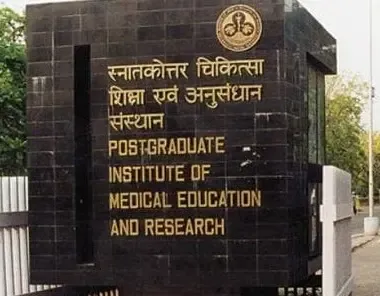Can Diabetic Patients Achieve Normal Blood Sugar Levels Without Medication? PGI Chandigarh Study Reveals

Synopsis
Key Takeaways
- Diabetes remission may be possible without medication.
- 31% of participants achieved normal blood sugar levels.
- The approach combines medication with lifestyle changes.
- Significant reductions in internal fat stores were observed.
- No serious side effects were reported during the study.
Chandigarh, Aug 2 (NationPress) A groundbreaking study from the Postgraduate Institute of Medical Education and Research (PGIMER) in Chandigarh reveals that individuals with diabetes can potentially revert to normal blood sugar levels without medication for a minimum of three months.
Traditionally, type 2 diabetes has been regarded as a lifelong and unchangeable ailment, necessitating daily medications, stringent diet plans, and continuous lifestyle adjustments. However, this recent clinical research offers a glimmer of hope, indicating that “remission” might be attainable through a well-structured and practical approach.
The term “remission” refers to achieving normal blood sugar levels, with HbA1c at 6.5 percent, without the aid of diabetes medication for at least three months. Type 2 diabetes, which impacts millions worldwide and is increasingly becoming a health crisis in India, has long been perceived as a chronic condition without a definitive cure. Patients are routinely informed that they must manage their condition indefinitely, with medications and blood sugar tracking becoming lifelong commitments. But what if there is a possibility to reset this process?
Under the leadership of Dr. Rama Walia, a team at PGIMER initiated the DiaRem-1 study to investigate whether effective blood sugar management through modern medications, complemented by lifestyle modifications, could induce “remission”. What distinguishes their research is that it does not depend on extreme weight loss diets or expensive surgical interventions, which may be impractical for many individuals.
The study involved adults diagnosed with type 2 diabetes within the last five years, whose blood sugar levels were still reasonably controlled. Participants were subjected to a three-month regimen combining effective diabetes medications and guidance on diet and exercise. After this period, all medications were halted, and researchers observed whether their blood sugar could remain in the normal range without drugs for the subsequent three months. The findings were remarkable.
Approximately one-third of participants (31 percent) achieved diabetes “remission,” meeting the international criteria of maintaining HbA1c below 6.5 percent without medication for at least three months. Surprisingly, both treatment groups—one receiving newer medications like liraglutide and dapagliflozin, and the other using widely available drugs like glimepiride and vildagliptin—exhibited similar rates of remission. The average weight loss was modest, with the intervention group losing 4.7 kg and the control group losing three kg.
Magnetic Resonance Imaging (MRI) scans of selected participants revealed significant reductions in internal fat stores, including a 51 percent decrease in liver fat and a 48 percent reduction in pancreatic fat, key factors contributing to insulin resistance and worsening diabetes. Medical professionals now recognize that two primary factors drive diabetes progression: glucotoxicity (excess sugar harming beta cells) and lipotoxicity (fat buildup impairing insulin function). By addressing these issues through medication and lifestyle changes, the pancreas can receive much-needed relief and may even start functioning more normally.
Participants who achieved remission also displayed improved beta-cell function (assessed through a “disposition index”) and reduced insulin resistance (HOMA-IR) compared to those who did not achieve remission. Notably, no specific patient characteristics, such as age, weight, or duration of diabetes, could predict success, making this approach applicable to a broad range of patients in early diabetes stages. What about side effects and safety?
The study indicated that minor side effects, such as nausea, were reported, particularly among those taking liraglutide, but no serious health risks were identified. Importantly, no patients in the intervention group experienced hypoglycemia, a common concern associated with diabetes medications.










